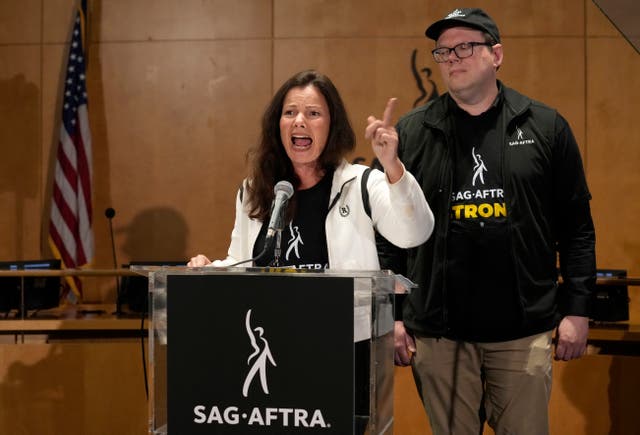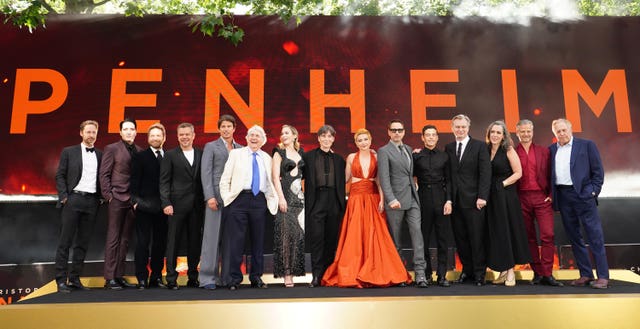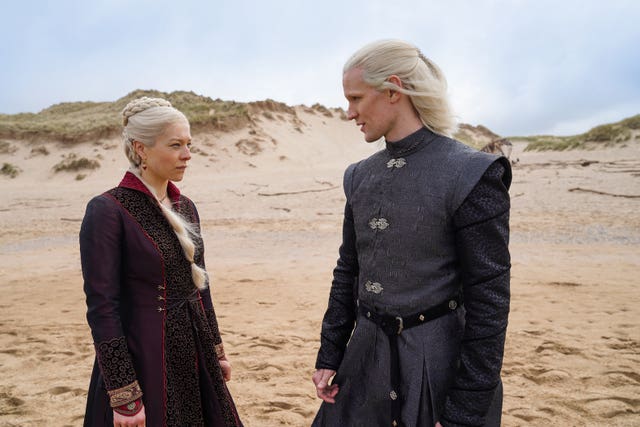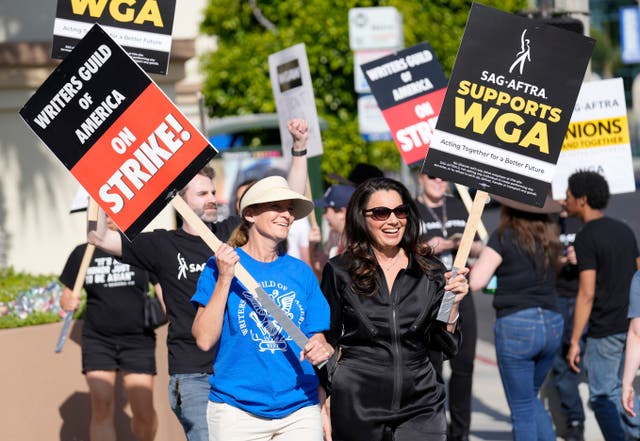US actors’ union Sag-Aftra strike: Everything you need to know
Strikes from sister unions in the US have already derailed multiple productions and industry events in recent months.

Hollywood and the creative industry at large has been dealt another blow following the announcement of strike action by US actors’ union Sag-Aftra.
Strikes from sister unions in the US have already derailed multiple productions and industry events in recent months.
Here’s what you need to know about the strike.
– Who is on strike?
Sag-Aftra, the US union representing thousands of industry professionals, officially declared a strike on Thursday.
The union, which has a membership of around 160,000, represents actors across film, television and radio.
It is the union’s first major members’ strike in over 40 years.
It comes as over 11,500 members of the Writers Guild of America (WGA) also remain on strike, having begun their own action on May 2.
– Why are the actors striking?
The strike has been called after Sag-Aftra failed to negotiate new contracts with the Alliance of Motion Picture and Television Producers (AMPTP).
Negotiations with the AMPTP had been going on for more than four weeks, and the contracts expired at midnight Pacific Time (8am UK time) on Wednesday, having been pushed back previously from June 30.
Issues up for negotiation included base compensation, which actors say has been undercut by inflation and the streaming services, the threat of unregulated use of artificial intelligence, and benefit plans.

In a previous statement, Sag-Aftra president Fran Drescher said the AMPTP’s response to the union’s proposals had been “insulting and disrespectful of our massive contributions to this industry”.
– Does the strike affect just actors in the US?
Sag-Aftra has members all over the world, all of whom are expected to respect the decisions of the union.
“Simply put, a Sag-Aftra member must always work under a union contract around the globe,” the union’s website states.
– Which big names are publicly supporting the strike?
Several Hollywood stars including Meryl Streep, Jennifer Lawrence and Ben Stiller, have previously expressed their support in favour of strike action, if a deal with AMPTP could not be reached.
On Thursday, Cillian Murphy, Emily Blunt, Florence Pugh and Matt Damon, Robert Downey Jr, Sir Kenneth Branagh and Rami Malek, all walked out of the London premiere of upcoming blockbuster Oppenheimer.

Sir Kenneth Branagh told the PA news agency beforehand: “Everybody is working very hard to make sure it doesn’t happen, if it happens I stand in solidarity with our Sag members.”
Murphy told PA: “I stand by my colleagues, that’s all I can say to you.”
– What are striking actors not allowed to do?
The union’s Global Rule One states: “No member shall render any services or make an agreement to perform services for any employer who has not executed a basic minimum agreement with the union.”
It clarifies that members do not work without a contract in films, scripted television, commercials, non-broadcast, interactive, new media, independent and student film productions, among others.
“If you are behind a microphone or in front of a camera, you should assume that (Global Rule One) applies until and unless an authorised representative of Sag-Aftra confirms that it does not,” the union’s website states.
Sag-Aftra says that it takes the rule “very seriously”, with violations resulting in disciplinary action ranging from reprimands, to fines to expulsion from the union.
– How long will the strike last?
Sag-Aftra has not given a time limit for the strike, which is due to begin at midnight Pacific Time (8am UK time) on Friday.
Asked how long the strike would last, Ms Drescher told a Los Angeles press conference: “That’s up to (the AMPTP), we are open to talking to them tonight.
“All of this is because of their behaviour, it’s up to them if they want to talk in a normal way.”
– How will this affect productions in the UK?
A number of major projects that are currently under way in the UK may be affected by the strike.
Among them is superhero blockbuster Deadpool 3, starring Hollywood actors Ryan Reynolds and Hugh Jackman – which may have its scheduled release date of May 2024 significantly impacted by the strike.
Similarly, new film Wicked starring US singer Ariana Grande, actress Cynthia Erivo, Bridgerton star Jonathan Bailey and Oscar winner Michelle Yeoh, which is being shot in a village in Buckinghamshire could also be affected, as the release date is currently set for November next year.

Other UK productions include Beetlejuice 2, vampire thriller The Radleys and psychological thriller Speak No Evil.
The second series of hit HBO TV series House Of The Dragon and Netflix’s The Sandman may also be affected, if actors can not participate under union guidelines.
– What does it mean for the upcoming awards ceremony?
The strike casts much doubt on upcoming award ceremonies, including the 75th annual Emmy Awards, the nominations for which were announced on Wednesday.
Sag-Aftra chief negotiator Duncan Crabtree-Ireland told a press conference on Thursday: “I anticipate this will bring any Emmy campaigning to a close.”
– How will the strike affect films that have already been shot?
The strike does not allow actors to engage in any form of promotion for films.

Some studios, including Disney, have said they still plan to host events including world premieres, though there will not be opportunities for press interviews.
– How does the Sag-Aftra strike relate to the Hollywood writers’ strike?
On Thursday the WGA entered its 73rd day of strike action, after their own contracts also expired earlier this year.
The writers’ union, which has a membership of around 20,000, is striking primarily over royalties from streaming media.
The WGA is seeking higher minimum pay, more writers per show and less exclusivity on single projects, among other demands – all conditions it says have been diminished during the content boom of the streaming era.





